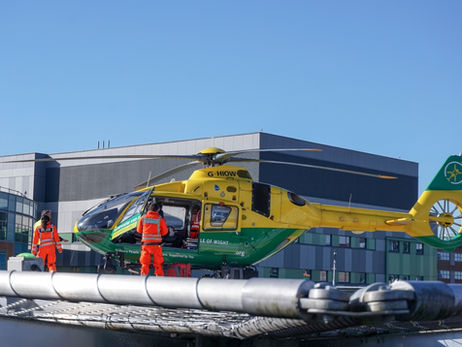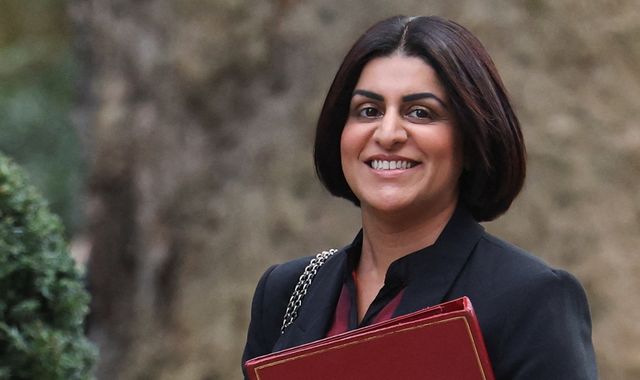He was also disqualified from driving for 17 years.
The grime artist, whose real name is Justin Clarke-Samuel, failed to stop after his BMW struck 20-year-old Yubin Tamang last October.
Clarke-Samuel, 41, had pleaded guilty to causing death by dangerous driving in Ilford, northeast London.
Mr Tamang, who had come to the UK from Nepal to study, died in hospital from his injuries two days after the crash.
Speaking after the sentencing, a spokesperson for Mr Tamang's parents said: "We speak today with hearts broken beyond repair.
"Our only child, a precious soul has been taken from us far too soon. He came to the UK to study and create a better life for himself and his family. Justin Clarke-Samuel has stolen our son's future and ours with it.
"We are relieved that Justin Clarke-Samuel pleaded guilty and that he has now been jailed, but we can never forgive him for what he has done."
The victim's mother, Sharmila Tamang, had earlier broken down in court, describing the "extreme pain" and "unimaginable sense of loss" of losing her only child.
Evidence showed that Clarke-Samuel, 41, was driving his BMW M5 at 74mph in a 30mph zone moments before he hit Mr Tamang as he crossed Redbridge Lane at 11.33pm on 18 October. Clarke-Samuel then failed to stop at the scene.
As the judge summarised the case, Clarke-Samuel, who was dressed all in black, sat in the dock with his eyes closed. He showed no emotion as the sentence was handed down.
He has been in custody since a preliminary appearance at Barkingside Magistrates' Court on 27 October.
Judge Mark Lucraft KC told Clarke-Samuel that CCTV footage showed a "quite appalling litany of incidents" leading up to the fatal collision which he described as "simply shocking".
After the crash, Clarke-Samuel had continued to drive for eight miles before going home and having six or seven shots of Ciroc vodka and a "cannabis cookie", the court heard.
When he was arrested several hours later, the BMW was found parked near his home, with significant damage including a smashed windscreen, extensive marks on the bonnet, damage to the front bumper and a missing wing mirror cover.
The court was told the defendant had claimed he had driven dangerously because he feared someone was following him, but no evidence of a pursuit was found on CCTV.
The judge noted Clarke-Samuel's "genuine remorse" and previous good work in the community, saying: "Your music has provided you with a following and a significant financial reward... I acknowledge that you have used that to good effect and done much to support many others."
He went on to say it was a "real shame" that "all that good work is marred by driving in drink and taking the life of another young man".
Ghetts describes his 'extreme regret, shame and remorse'
Speaking for the defence, Benjamin Aina KC, told the court that Clarke-Samuel had written a letter in which he expressed his remorse for his actions on that night.
Mr Aina said the father-of-two wanted to apologise to "the family of Mr Tamang, the community at large, to his own family, and to the court for his actions on that Saturday night of October last year".
Reading an extract from Clarke-Samuel's letter, Mr Aina said: "I write from a place of extreme regret, shame and remorse… I cannot express the enormous feeling of guilt and shame for the suffering I have caused."
The letter went on: "I want Mr Tamang's family to know that I am so truly sorry. I offer no excuses, and I have let my family and community down."
Erratic driving and a further collision
The court was shown CCTV footage of Clarke-Samuel driving erratically through the streets of London and showed the moment Mr Tamang was hit by the car.
Prosecutor Philip McGhee told the court Clarke-Samuel's vehicle had thrown Mr Tamang into the air before he crashed to the ground in the road.
Mr McGee said Mr Tamang was hit at 67mph, more than double the permitted maximum speed in that area.
The court was also told Clarke-Samuel had been involved in a collision with a Mercedes on the same night, and had narrowly avoided striking a cyclist.
In December, Clarke-Samuel admitted a charge of dangerous driving in Tavistock Place, in the Bloomsbury area of central London, and on other roads in Camden, Islington and Hackney ahead of the crash.
The court heard that Clarke-Samuel has 12 previous convictions for 27 offences, including robbery, aggravated vehicle taking and dangerous driving, dating back to 2000.
Speaking outside the court after the sentencing, Shani Taggart, of the Crown Prosecution Service, said: "Justin Clarke-Samuel knew he was in no fit state to drive and there was clear evidence of his excessive speed and disregard for road users as he drove incredibly dangerously across our city.
"After presenting this evidence, we secured guilty pleas to these two charges and today's sentence will see Clarke-Samuel face the consequences of his fatal decision to get behind the wheel of a car after drinking."
Detective Sergeant Faye Cook, who led the Met's investigation, said: "We hope today's sentencing brings some measure of comfort to Yubin's family, while also serving as a reminder to the public of the devastating consequences of dangerous driving."
Who is Ghetts?
The rapper and songwriter, a two-time Mercury Prize nominee, has collaborated on tracks with Skepta, Stormzy and Ed Sheeran, and performed at Glastonbury several times, including in 2024.
He won best male act at the 2021 MOBO Awards and received the MOBO pioneer award in 2024.
He also starred as a gang leader called Krazy in the Netflix sci-fi series Supacell about five black south Londoners who unexpectedly develop superpowers.

















































